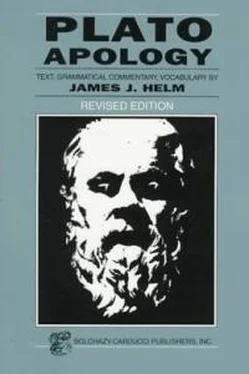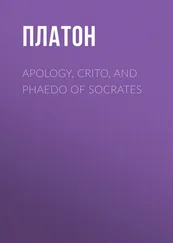*****
'Few persons will be found to wish that Socrates should have defended himself otherwise,'—if, as we must add, his defence was that with which Plato has provided him. But leaving this question, which does not admit of a precise solution, we may go on to ask what was the impression which Plato in the Apology intended to give of the character and conduct of his master in the last great scene? Did he intend to represent him (1) as employing sophistries; (2) as designedly irritating the judges? Or are these sophistries to be regarded as belonging to the age in which he lived and to his personal character, and this apparent haughtiness as flowing from the natural elevation of his position?
For example, when he says that it is absurd to suppose that one man is the corrupter and all the rest of the world the improvers of the youth; or, when he argues that he never could have corrupted the men with whom he had to live; or, when he proves his belief in the gods because he believes in the sons of gods, is he serious or jesting? It may be observed that these sophisms all occur in his cross–examination of Meletus, who is easily foiled and mastered in the hands of the great dialectician. Perhaps he regarded these answers as good enough for his accuser, of whom he makes very light. Also there is a touch of irony in them, which takes them out of the category of sophistry. (Compare Euthyph.)
That the manner in which he defends himself about the lives of his disciples is not satisfactory, can hardly be denied. Fresh in the memory of the Athenians, and detestable as they deserved to be to the newly restored democracy, were the names of Alcibiades, Critias, Charmides. It is obviously not a sufficient answer that Socrates had never professed to teach them anything, and is therefore not justly chargeable with their crimes. Yet the defence, when taken out of this ironical form, is doubtless sound: that his teaching had nothing to do with their evil lives. Here, then, the sophistry is rather in form than in substance, though we might desire that to such a serious charge Socrates had given a more serious answer.
Truly characteristic of Socrates is another point in his answer, which may also be regarded as sophistical. He says that 'if he has corrupted the youth, he must have corrupted them involuntarily.' But if, as Socrates argues, all evil is involuntary, then all criminals ought to be admonished and not punished. In these words the Socratic doctrine of the involuntariness of evil is clearly intended to be conveyed. Here again, as in the former instance, the defence of Socrates is untrue practically, but may be true in some ideal or transcendental sense. The commonplace reply, that if he had been guilty of corrupting the youth their relations would surely have witnessed against him, with which he concludes this part of his defence, is more satisfactory.
Again, when Socrates argues that he must believe in the gods because he believes in the sons of gods, we must remember that this is a refutation not of the original indictment, which is consistent enough—'Socrates does not receive the gods whom the city receives, and has other new divinities'—but of the interpretation put upon the words by Meletus, who has affirmed that he is a downright atheist. To this Socrates fairly answers, in accordance with the ideas of the time, that a downright atheist cannot believe in the sons of gods or in divine things. The notion that demons or lesser divinities are the sons of gods is not to be regarded as ironical or sceptical. He is arguing 'ad hominem' according to the notions of mythology current in his age. Yet he abstains from saying that he believed in the gods whom the State approved. He does not defend himself, as Xenophon has defended him, by appealing to his practice of religion. Probably he neither wholly believed, nor disbelieved, in the existence of the popular gods; he had no means of knowing about them. According to Plato (compare Phaedo; Symp.), as well as Xenophon (Memor.), he was punctual in the performance of the least religious duties; and he must have believed in his own oracular sign, of which he seemed to have an internal witness. But the existence of Apollo or Zeus, or the other gods whom the State approves, would have appeared to him both uncertain and unimportant in comparison of the duty of self–examination, and of those principles of truth and right which he deemed to be the foundation of religion. (Compare Phaedr.; Euthyph.; Republic.)
The second question, whether Plato meant to represent Socrates as braving or irritating his judges, must also be answered in the negative. His irony, his superiority, his audacity, 'regarding not the person of man,' necessarily flow out of the loftiness of his situation. He is not acting a part upon a great occasion, but he is what he has been all his life long, 'a king of men.' He would rather not appear insolent, if he could avoid it (ouch os authadizomenos touto lego). Neither is he desirous of hastening his own end, for life and death are simply indifferent to him. But such a defence as would be acceptable to his judges and might procure an acquittal, it is not in his nature to make. He will not say or do anything that might pervert the course of justice; he cannot have his tongue bound even 'in the throat of death.' With his accusers he will only fence and play, as he had fenced with other 'improvers of youth,' answering the Sophist according to his sophistry all his life long. He is serious when he is speaking of his own mission, which seems to distinguish him from all other reformers of mankind, and originates in an accident. The dedication of himself to the improvement of his fellow–citizens is not so remarkable as the ironical spirit in which he goes about doing good only in vindication of the credit of the oracle, and in the vain hope of finding a wiser man than himself. Yet this singular and almost accidental character of his mission agrees with the divine sign which, according to our notions, is equally accidental and irrational, and is nevertheless accepted by him as the guiding principle of his life. Socrates is nowhere represented to us as a freethinker or sceptic. There is no reason to doubt his sincerity when he speculates on the possibility of seeing and knowing the heroes of the Trojan war in another world. On the other hand, his hope of immortality is uncertain;—he also conceives of death as a long sleep (in this respect differing from the Phaedo), and at last falls back on resignation to the divine will, and the certainty that no evil can happen to the good man either in life or death. His absolute truthfulness seems to hinder him from asserting positively more than this; and he makes no attempt to veil his ignorance in mythology and figures of speech. The gentleness of the first part of the speech contrasts with the aggravated, almost threatening, tone of the conclusion. He characteristically remarks that he will not speak as a rhetorician, that is to say, he will not make a regular defence such as Lysias or one of the orators might have composed for him, or, according to some accounts, did compose for him. But he first procures himself a hearing by conciliatory words. He does not attack the Sophists; for they were open to the same charges as himself; they were equally ridiculed by the Comic poets, and almost equally hateful to Anytus and Meletus. Yet incidentally the antagonism between Socrates and the Sophists is allowed to appear. He is poor and they are rich; his profession that he teaches nothing is opposed to their readiness to teach all things; his talking in the marketplace to their private instructions; his tarry–at–home life to their wandering from city to city. The tone which he assumes towards them is one of real friendliness, but also of concealed irony. Towards Anaxagoras, who had disappointed him in his hopes of learning about mind and nature, he shows a less kindly feeling, which is also the feeling of Plato in other passages (Laws). But Anaxagoras had been dead thirty years, and was beyond the reach of persecution.
Читать дальше












